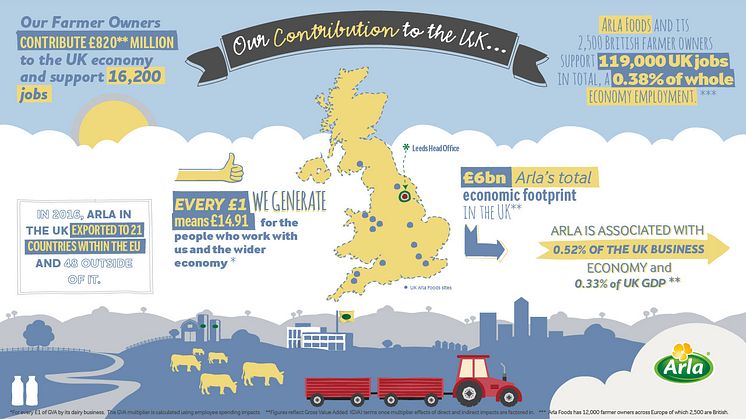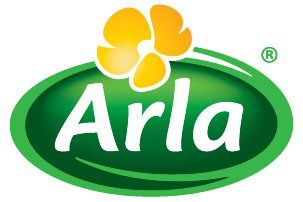
Press release -
UK Government urged to protect British dairy farming in Brexit negotiations
This week, Arla Foods and its farmer owners are urging the UK Government to recognise and protect the future of dairy within the forthcoming Brexit negotiations or risk undermining a key sector within the UK economy.
Drawing on findings from a recent economic impact assessment carried out by independent economics consultancy Centre for Economics and Business Research (Cebr), Arla is warning that the contribution made by its business and farmer owners to the UK economy would come under severe pressure if Brexit negotiations lead to significant restrictions on free trade and quotas.
According to the report, Arla’s total economic footprint in the UK is valued at more than £6 billion in Gross Value Added[1] (GVA) terms once multiplier effects[2] of direct and indirect impacts are factored in. This is equivalent to 0.52% of the entire UK business economy and 0.33% of UK GDP. For example, for every £1 of GVA generated by Arla’s dairy business in the UK, another £14.91 is stimulated in its supply chain and in the wider economy.[3]
Further, the report concludes that the combined businesses of Arla and its farmer owners directly supports more than 50,000 jobs in the UK and can be indirectly associated with more than 119,000 jobs in total, which equates to a 0.51% share of employment in the entire UK business economyand 0.38% of whole economy employment.
Like many businesses, Arla and its farmer owners rely on free trade, particularly when it comes to exporting – in 2016, Arla exported to 21 countries within the EU and 48 outside of it. In addition, the UK also imports a number of popular Arla products from elsewhere in the EU.
Tomas Pietrangeli, Managing Director of Arla Foods UK, said:
“Our business and our farmer owners make a major contribution to the UK economy, playing a key role in the UK food and farming sector, which is estimated to be worth over £100 billion[4].
“While it’s true that Brexit will bring opportunities that we are ready to embrace, ending tariff-free trade should be seen as a major risk. We need assurances that the transitional arrangements we are likely to require before a free trade agreement between the UK and the EU is agreed are tariff- and barrier-free. To do otherwise will be detrimental not only to us but to many other organisations.
“That’s why we’re calling on Government to protect the health of the British dairy industry and its broader benefits to the wider UK economy and, in doing so, ensuring agriculture and food and drink production are front and centre of its negotiation efforts.”
Oliver Hogan, Director at Cebr and principal author of the report said:
“The true extent of Arla’s economic ‘footprint’ in the UK cannot be underestimated. It’s a business that is deeply embedded in the British economy, not only through its farmer owners and core dairy business, but also through a large and wide-ranging domestic supply chain and through its downstream links with the distributive trades (retail and wholesale).”
The farmer-owned company in the UK had a revenue of €2.53 billion in 20166 with circa 2,500 of its owners in the UK. Home to a range of well-known brands including Anchor, Castello, Cravendale and Lurpak, as well as the Arla brand itself, Arla is responsible for almost a third (29.4%) of the entire UK dairy manufacturing industry[5].
Being farmer-owned means the profit it makes goes back to those farmers.
Arla farmer owner and member of Arla amba’s Board of Representatives, David Christensen, said:
“The triggering of Article 50 has fired the starting gun to the Brexit negotiations and it is important that British dairy is not left behind. This analysis shows what could be at risk but also the opportunity following the negotiations. We are eager to make Brexit work in a way that supports Arla and its farmer owners.”
[1]GVA measures the contribution to the economy of each individual producer, industry or sector in the UK.
[2]These refer to indirect and induced multiplier impacts. Indirect impacts refer to the value generated and jobs supported in industries that supply inputs to Arla Foods and its farmer owners. Induced impacts refer to the value generated and jobs supported in the wider economy when the direct and indirect employees of Arla Foods and its farmer owners spend their earnings on final goods and services.
[3]Multiplier impacts are obtained by embedding the data representing Arla’s economic activities within the models of the UK economy that we use, as is standard practice, to assess the kinds of impacts that can be associated with an entity like Arla Foods. These models establish the relationships between industries through supply chain linkages, as well as industries’ linkages with government, capital investors and the rest of the world (through trade).
[4]http://www.nfuonline.com/back-british-farming/the-economy/
[5]‘This is Arla’s 2015 share of ‘whole industry turnover’ for sector 10.5 under the Standard Industrial Classification system – manufacture of dairy products.
6 €2.53bn represents the total revenue from Arla in the UK in 2016 and includes all sales that occur. In the recent 2016 annual results, the €2.2bn figure reflects revenue from our UK commercial activities excluding areas such as Arla Foods Ingredients, trading and logistics service in supply chain.
Topics
Arla Foods is a global dairy company and co-operative owned by 12,000 dairy farmers with circa 2,500 of whom are British.
Dating back to 1881, Arla’s purpose is to secure the highest value for its farmers’ milk, while creating opportunities for their growth. With production facilities in 11 countries and sales offices in a further 30, Arla is the world’s fifth largest dairy company and largest supplier of organic dairy products. Arla has a total of more than 18,000 colleagues and its products are sold under the well-known brands Arla®, Lurpak® and Castello® in more than 100 countries.
Arla Foods UK is the largest dairy company in the country and is home to leading dairy brands Anchor®, Arla Cravendale®, and Arla Lactofree® with a turnover of €2.2 billion. The UK is largest market within the Europe Zone, contributing 35% of the zone’s turnover and also comprises 25% of the Group revenue.
As well as being a leading supplier of fresh milk, number one in butter, spreads and cream, Arla is the UK’s largest cheese manufacturer. It has also built the world’s largest fresh milk facility located at Aylesbury that later this year will become the first net zero carbon site of its kind. The UK business has a team of approximately 3,500 colleagues located at its dairies, creameries, distribution centres and head office.

